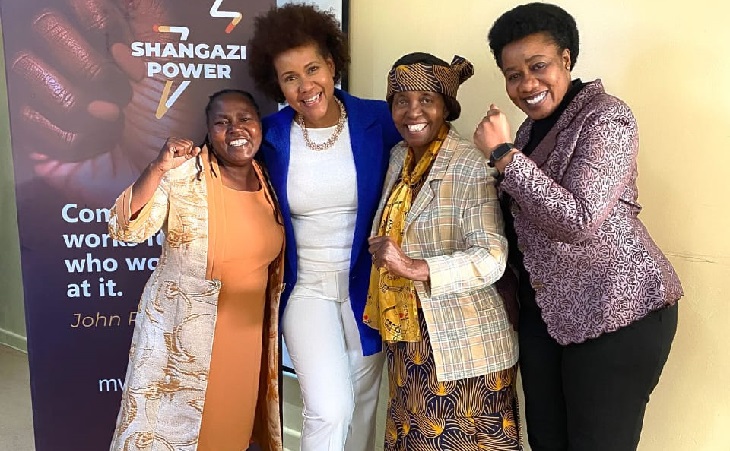Shangazi in Kiswahili means paternal aunt and in many cultures of the region is one of the most powerful female figures in a family.
A Swahili is saying: “Shangazi ni Baba” which connotes that in the absence of the Father, the Paternal Aunt is looked upon as a decision-maker.
The term is very respectful and different from the generally used “auntie”. It gained more respect and special status in Tanzania during the reign of John Magufuli, when in 2018 he threatened people from Southern Tanzania and warned them in a speech not to try to protest otherwise he would send in forces to beat their “shangazis”.
This speech was laced with such shocking violence against women that it riled up a number of them who until then, and going forward had been very critical of Magufuli’s governance. Prominent “Shangazis” included Fatma Karume, Maria Sarungi, and Vicensia Shule.
And with time, more and more joined the ranks. Today Shangazi remains an honorific, a way to recognize women who have challenged authoritarianism, fought for rights, and stood up to patriarchy.
Shangazi Power Movement is all about amplifying the voices of women in the East African region through storytelling. According to the voices behind the movement, including Maria Sarungi, and Mwanzo TV, the movement is for amplifying the voices of women in East Africa (Kenya, Tanzania, and Uganda) through storytelling as an effective way for women to empower themselves by sharing their experiences and the challenges they lived through.
Telling the stories of these exceptional women and thereby shaping public perception. Using strategic communication to amplify the voices of women-led organizations and support their strategic communication to strengthen women’s movements in East Africa and to make them more effective, more resilient, and more visible. The Shangazi Network aims to create a safer environment for all women activists.
There is no doubt that women in East Africa, like in many parts of the world, face numerous challenges when it comes to having their voices heard, amplified, and empowered.
These challenges are deeply rooted in cultural, social, and economic factors, making it difficult for women to participate fully in decision-making processes and express their opinions.
One of the most significant challenges is the deeply ingrained gender stereotypes that limit women’s roles to the domestic sphere leaving women in the region struggling to overcome and defy the patriarchy within the society and even movements.
Traditional gender roles often confine women to caregiving and household chores, relegating them to the sidelines in public discourse and leadership positions. This societal bias perpetuates the notion that women’s voices are less valuable or less knowledgeable than men’s.
There is no doubt that women in East Africa often lack access to quality education and economic opportunities. Limited access to education means that many women are unable to develop the skills and knowledge necessary to engage in meaningful discussions and advocate for their rights.
Economic disparities also play a crucial role, as poverty can limit women’s ability to participate in political or community activities due to time and resource constraints. Furthermore, there are legal and political barriers that hinder women’s participation in decision-making.
Discriminatory laws and policies, coupled with a lack of representation in government and other influential positions, make it challenging for women to advocate for their interests effectively. Cultural norms and practices that perpetuate gender-based violence also serve as deterrents, as women may fear reprisals for speaking out.
Despite these challenges, women in East Africa are resilient and continue to make strides in asserting their voices. Advocacy groups, international organizations, and grassroots movements are working tirelessly to challenge societal norms and empower women to participate in public life.
Efforts to provide education and economic opportunities for women are also gaining momentum, slowly breaking down the barriers that have long silenced their voices. While the road ahead is steep, the determination of East African women to have their voices heard is undeniably strong, promising a more inclusive and equitable future for all.
The truth is that oppressive systems in East Africa have been challenged since independence (and even during the struggle for independence) by women who faced a dual challenge of overcoming and defying the patriarchy within the society and even movements. Some prominent examples include Bibi Titi Mohamed of Tanganyika and Wangari Maathai of Kenya.
Studies have shown however that “beyond gender-specific movements, and frequently without recognition, women activists have organized and led countless movements for rights and freedom around the world.
Women activists continue to face a myriad of challenges – are labeled as loose, unmarried, ugly, and unwanted in an attempt to strip them of their dignity. They continuously face sexual violence, and attacks on the media more than often their efforts in activism are muzzled. Women’s activism and organizing is happening in person – “offline”.
More than often their activities are not covered by social or mainstream media due to the entrenched patriarchal systems. One major challenge for these women activists is the lack of media attention on their roles in shaping movements and change.
There is a need to continue expanding spaces, networks, and visibility of women activists to engage Shangazi Power will amplify women’s voices through storytelling as an effective way for women to empower themselves by sharing their lived experiences.
Related Content: Kenyan Women Adopted the “Change Or Perish” Model To Cope With The High Cost Of Living

